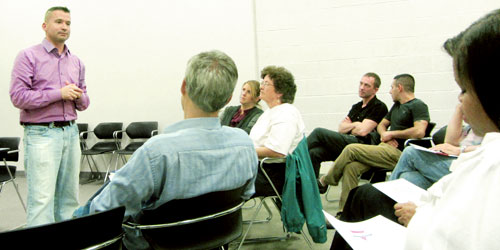
FERNDALE –
After listening to the Oct. 25 presentation from the Affirmations Multi-Cultural Advisory Committee, Kofi Adoma had to speak.
With tears in her eyes, the 56-year-old black, lesbian activist said thank you to those who had spent the past four years sorting out the complexities of racial tensions that occurred as various groups struggled to form in the 80s and 90s, and challenges that have taken place over the years as diverse people come together at the community center.
"As one of the people at the table as Affirmations was forming, I was there to make sure it was going to be racially inclusive. When we found out it would not be in Detroit, it caused tension. To hear that history acknowledged, it means so much. I've been around a long time, I never thought I'd see this," Adoma said. "I'm speaking on behalf of a lot of people who didn't make it. There's something about validation. I feel good about all of this. All the work you've put into this, really sends a strong, powerful message, especially to someone like me who has seen all of this."
The Multi-Cultural Advisory Committee (MAC) was formed in May 2008, in response to protests that were being held after an African American employee was let go. The employee claimed it was discrimination and soon the conversation exploded. People spoke about the lack of staff members of color, and questioned the organization locating in Ferndale rather than Detroit. People pointed to the Affirmations Board of Directors and questioned why there were not more minorities represented. Other volunteers and center visitors spoke up about how they too thought Affirmations could be more welcoming and affirming to all, and the MAC was formed to explore these complaints and move the center forward.
The report is the result of seven surveys reaching over 600 community center users, employees, former employees, volunteers, and former volunteers, six focus groups, records gathering from employee records and the Census, plus meetings of the committee over a four year period of time. Kat Latosch, who presented the report, explained that they wanted to be thorough. "Not just for those of us here at Affirmations, but so that this can be a model for other community centers to use."
There is also a plan, which should take three years to fully implement. The plan has goals for the board, staff and programming as follows:
Board
1.Increase representation of people of color (POC) on the Board to at least 40 percent.
2.Increase race sensitivity of board members through training and development.
3.Increase the board's visibility in POC communities and at their sponsored events.
4.Explore developing a leadership coalition for board members of Affirmations and board members of POC organizations.
5.Require the executive director to engage in partnerships and collaborative programs/initiatives with POC organizations.
6.Ensure that all organizational policies are inclusive.
7.Ensure vision and mission of Affirmations are clear and inclusive of communities of color
Staff
1.Increase representation of people of color on staff at supervisory levels through changes to recruitment and selection processes and other initiatives.
2.Establish a work environment that fosters inclusion through implementation of an annual employee training on racial diversity and inclusion, improving internal dialogue on race issues, establishing an ombudsman, and including an assessment of each employee's diversity commitment in their annual performance reviews.
3.Involve all staff in reaching out to communities of color.
4.Implement a buddy/mentoring system for new hires.
5.Provide opportunities for staff to work on a project outside of their department/job focus.
6.Implement an employee recognition program.
7.Explore expanded benefits options.
Programs
1.Strengthen collaborative relationships with POC organizations.
2.Increase POC participation in program development through expanded partnerships with POC organizations.
3.Increase participation and promotion of programs within POC communities through collaboration.
Affirmations Executive Director Dave Garcia was excited about the future goals, and he also shared some accomplishments Affirmations has achieved so far. "Much of this is personal to me," Garcia said. "I was raised in a Mexican family, from the language and the food and the Catholic religion and all that comes with it. I am very committed to seeing Affirmations grow. Not only is your executive director a Mexican American, Johnny Jenkins is our director of programs. We've already reached out to community organizations." He stated that the center is open for diverse groups to use, and that Detroit Latinos and Transgender Detroit are already using office space there.
More implementation is needed. That's why Affirmations is currently organizing the MAC II, a committee to work for the next three years on making sure the steps are taken towards more inclusiveness. Those who are interested in serving on MAC II can contact Kat LaTosch for more information at [email protected]. For more information on Affirmations and to download the entire report, go to http://www.goaffirmations.org.










